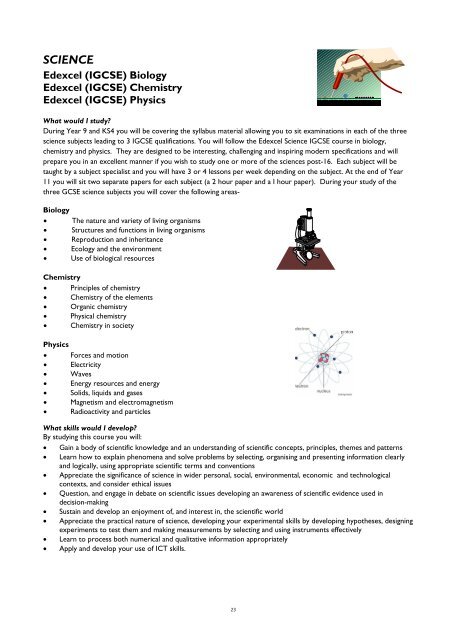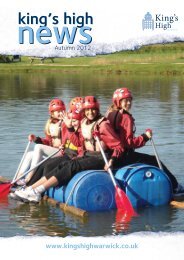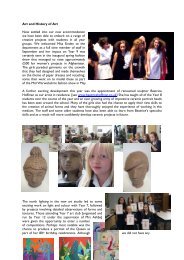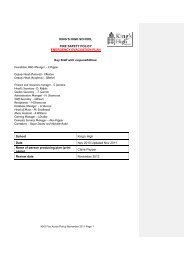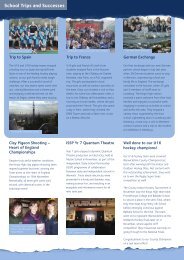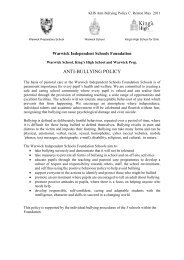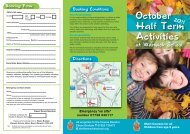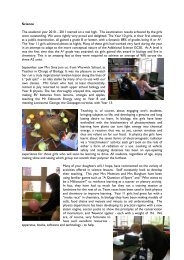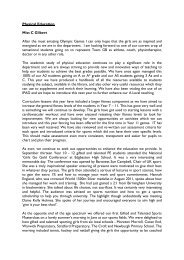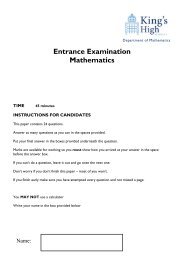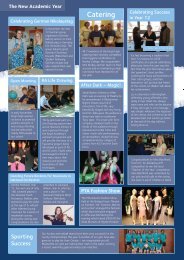GCSE options booklet - King's High
GCSE options booklet - King's High
GCSE options booklet - King's High
You also want an ePaper? Increase the reach of your titles
YUMPU automatically turns print PDFs into web optimized ePapers that Google loves.
SCIENCE<br />
Edexcel (I<strong>GCSE</strong>) Biology<br />
Edexcel (I<strong>GCSE</strong>) Chemistry<br />
Edexcel (I<strong>GCSE</strong>) Physics<br />
What would I study?<br />
During Year 9 and KS4 you will be covering the syllabus material allowing you to sit examinations in each of the three<br />
science subjects leading to 3 I<strong>GCSE</strong> qualifications. You will follow the Edexcel Science I<strong>GCSE</strong> course in biology,<br />
chemistry and physics. They are designed to be interesting, challenging and inspiring modern specifications and will<br />
prepare you in an excellent manner if you wish to study one or more of the sciences post-16. Each subject will be<br />
taught by a subject specialist and you will have 3 or 4 lessons per week depending on the subject. At the end of Year<br />
11 you will sit two separate papers for each subject (a 2 hour paper and a I hour paper). During your study of the<br />
three <strong>GCSE</strong> science subjects you will cover the following areas-<br />
Biology<br />
• The nature and variety of living organisms<br />
• Structures and functions in living organisms<br />
• Reproduction and inheritance<br />
• Ecology and the environment<br />
• Use of biological resources<br />
Chemistry<br />
• Principles of chemistry<br />
• Chemistry of the elements<br />
• Organic chemistry<br />
• Physical chemistry<br />
• Chemistry in society<br />
Physics<br />
• Forces and motion<br />
• Electricity<br />
• Waves<br />
• Energy resources and energy<br />
• Solids, liquids and gases<br />
• Magnetism and electromagnetism<br />
• Radioactivity and particles<br />
What skills would I develop?<br />
By studying this course you will:<br />
• Gain a body of scientific knowledge and an understanding of scientific concepts, principles, themes and patterns<br />
• Learn how to explain phenomena and solve problems by selecting, organising and presenting information clearly<br />
and logically, using appropriate scientific terms and conventions<br />
• Appreciate the significance of science in wider personal, social, environmental, economic and technological<br />
contexts, and consider ethical issues<br />
• Question, and engage in debate on scientific issues developing an awareness of scientific evidence used in<br />
decision-making<br />
• Sustain and develop an enjoyment of, and interest in, the scientific world<br />
• Appreciate the practical nature of science, developing your experimental skills by developing hypotheses, designing<br />
experiments to test them and making measurements by selecting and using instruments effectively<br />
• Learn to process both numerical and qualitative information appropriately<br />
• Apply and develop your use of ICT skills.<br />
23


